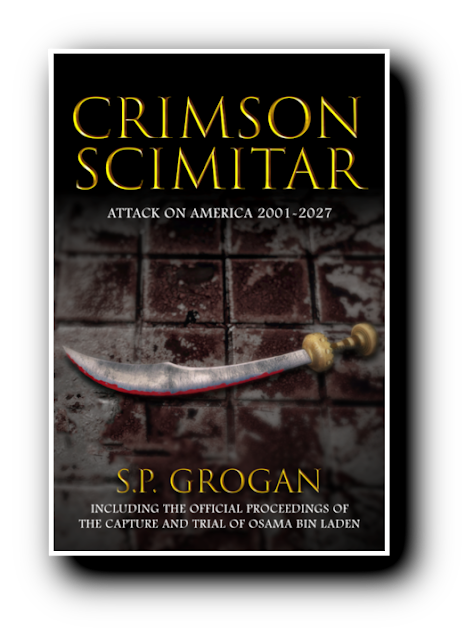Title: The Five Watches
Author: John R. York
Publisher: DocUmeantPublishing
Pages: 316
Genre: Time Travel
What might happen if a
handful of people living in different eras became entangled in time,
some intentionally and some accidentally? The nineteenth-century
scientist, Dr. Wilhelm Gussen, is passionate about improving the welfare
of mankind, and so he begins a journey through time in a quest to learn
about future advances in epidemiology. Physicist Emory Lynch, from the
twenty-seventh century, studies an old pocket watch, said to be a time
travel device, and accidently stumbles into the twenty-first century. In
2019, Jim Zimmerman, the de facto neighborhood go-to guy, finds himself
caught in the middle of a clandestine, future conspiracy. True to his
character, he becomes inextricably involved in future affairs that
involve saving humanity from itself—dragging his wife and a few
neighbors along for the ride. Thus, begins a time travel adventure that
examines the stubborn predictability of human behavior and how some
things, even over time, never seem to change.
Praise:
“The Five Watches
is filled with interesting characters and enchanting tapestries woven
into the fabric of time itself. John explores not only the ravages of
time but more importantly the impact of individual kindness, caring, and
selflessness towards others that is heartwarming. I enjoyed this
suspenseful page turner, the connection to everyday people and to
imaginable heroes that we can all strive to become. Uplifting! – Jim
Richards, Beta Reader
Amazon: https://tinyurl.com/46fjjp6f
Excerpts from three different parts of the book:
1868
The
alchemist stared at the blood pooling steadily beneath his body. The
increasing pain from his injuries heightened his awareness of the
fragility of this human body he was inhabiting. A sense of regret
overcame him, not due his likely death, but because the experiment of
being human would soon end.
Another man knelt beside him. “Master Votava! Oh, my God! Master
Votava, you have been badly injured.” Distraught, the man was rocking
back and forth overcome with grief. “Oh, look at you.”
“Calm yourself, Baysongur.” This interruption in fully experiencing
his death gave him a moment to realize there was something he needed to
do. “Go, gather the charm quark warp appliances. You must take them away
from this cursed, violent city. Take them far away.” Votava coughed,
wincing with pain as he did so.
“I must try to save you,” Baysongur pleaded.
“You cannot save me. If you must save something, save the stones. Do you understand? Go, get the stones.”
“Yes, yes, but what should I do with them? Where should I go?”
“I don’t know,” Votava growled with irritation. He wanted to get back
to concentrating on this unique process of dying. “Take them to
Leipzig.”
“What should I do with them?”
“Keep them safe. If you need help, find somebody you can trust,
perhaps a scientist.” Where the stones were taken didn’t really matter.
Votava would find and recover them once he was released from this frail
casing.
Ignoring the chaos of the riots still churning just outside the shop,
Baysongur hurriedly collected the stones and stuffed them inside his
old leather valise. After a moment’s hesitation, he also grabbed all the
documentation his employer had created regarding the mysterious
devices. Finally, he added a few articles of clothing and a loaf of
bread sitting on the apothecary’s counter.
“I should stay with you,” he said as he knelt back down next to Votava.
“No. Leave now but be careful of the mob outside. Protect the stones.”
“God be with you,” Baysongur said earnestly, a tear rolling down his bearded cheek.
Votava smiled. “Go.”
As he lay on the floor thinking his mortal life would end at any
moment, he focused on all the sensations of being in this carbon-based
body. Upon further reflection, he couldn’t really say it was a
comfortable existence. The sentient beings on this planet were
inherently violent and the living conditions left much to be desired.
Yet, a biological body was quite novel.
Several hours passed before a lone figure entered the shop and found
him lying in a pool of blood on the floor. To his shock and growing
concern, he was still alive. Two men eventually placed him on a
stretcher and carried him out to a horse drawn ambulance. The degree and
length of his suffering was unbearable. His original essence could not
be released until the biological body expired. Although this lingering
death was unexpected, there was little chance it would impact the
recovery his precious Star Stones. After all, what could go wrong?
2019
Jim walked into the house and plopped down in his recliner. He was
tired. The afternoon was all but gone and he wasn’t sure he felt like
starting any new projects. Perhaps he would go relax in one of the
lounge chairs on the back porch and have a cold beer after all. On
second thought, maybe the porch was too exposed, too accessible. He
could go to the garage, leave the light off, get into his car, and
recline the seat back low enough that nobody would be able to find him.
Jim smiled at the idea.
His next conscious thought was a vague awareness that someone was
knocking at the back door. Where were Zoe and Michael? He got up from
the recliner, trying to shake the cobwebs from his mind, and saw Emory
standing on the other side of the sliding glass door. Now what?
Jim rubbed his eyes. “Hello, Emory. What is it?”
Emory stood stoically for a moment, regarding him intensely, but
saying nothing. After what seemed like an eternity, he continued, “May I
speak with you, privately?”
“I have something very urgent to discuss with you, and it must be a
private conversation.” Emory’s gaze was so intense that Jim felt mildly
alarmed.
“Um, uh. Can you tell me what it’s about?” Jim was now searching the
backyard for some sign of Zoe or Michael, but nobody else was around.
“It is something very important, but quite unusual,” Emory said just above a whisper. “Please.”
“Okay, okay. Come in. I have a small office at the front of the
house. We can talk there. There doesn’t appear to be anybody else home
right now anyway.”
Jim led Emory through the house to his office and shut the door. “Have a seat.”
Emory perched precariously on the edge of an armchair positioned next
to Jim’s desk, and Jim sat in his plush leather chair and waited
expectantly.
Emory began. “First, allow me to tell you that I have selected you
out of several potential candidates. I have been here for about a month,
looking for someone to help me, someone trustworthy, strong of
character, and pure of heart.”
These words surprised Jim causing him to feel a little
self-conscious. “Sounds like you’re looking for Sir Galahad,” he
chuckled. “Well, I hope you have the right guy.”
“I do,” Emory said flatly. “I am here from another time, a time far in the future, and I am going to need your help.”
After taking several seconds to let Emory’s unexpected announcement
sink in, Jim was thinking he should be laughing at the incredulity of
such a claim, but for some reason he wasn’t. Perhaps it was the
solemnity of Emory’s demeanor and the conviction with which he spoke.
Given how the rest of his day had gone, this actually didn’t seem so
unusual. Just another person in the neighborhood assuming he would help
without question.
The silence stretched between them as Jim mulled the announcement
over and Emory waited for a reaction. Jim tried to process this in his
typical analytical manner, but there was ‘insufficient data’.
“Let me ask you a few questions, Emory,” Jim began thoughtfully.
“First of all, are you human?” He asked this as a mostly serious
question because of this man’s unusual features.
“Yes, Jim, I am human. I am what nearly all humans look like in the
place and the time from which I came. I am aware that I do not look
exactly normal, as you would probably define it. My appearance is due to
an extended period of genetic engineering, and, of course, centuries of
evolution. This condition is partly why I am here asking you for help. I
realize that most people would assume that I am not mentally stable in
making such a claim.”
2619
After his narrow escape, he immediately made his way to Ronald Reagan
Airport and purchased a ticket to Orlando, a place he already knew
would be one of the last outposts of human civilization. When he arrived
at the Orlando airport, he immediately reset the watch he’d used to
escape his would be captors and inserted the key.
After the jump in time, the bustling airport he’d been standing in
just moments before had become an overgrown ruin of crumbling buildings
connected by the metallic skeletons of structures no longer recognizable
for the function they once served. The crowds of people were gone, the
aircraft were gone. The terminal’s cacophony of sounds had been replaced
by soft whisper of the wind and the songs of distant birds. The
contrast was unsettling.
He'd chosen this time, 2616, because he was determined to find out
what had happened. Why had humans become nearly extinct? What were the
living conditions this far into the future? How had we evolved?
A patrol of securitymen found him wandering along a path about a mile
or so from the Compound, and not a moment too soon. The subtropical air
was hot and humid, and the heavily wooded area was teaming with
unfriendly wildlife.
Although glad to be rescued, Wilhelm was apprehensive about the
demeanor of the men escorting him. They seemed stiff, stern, and
displeased with his presence. Only one of them said anything at all, and
that, he presumed, was a simple question: something to the effect of
“Who are you?” Although he didn’t exactly understand what the man said,
he responded instinctively with his name. The same man then barked and
order that he assumed meant, “Follow us.”
When the Compound came into view, Wilhelm felt relief. The place
appeared quite substantial, like a walled city. Everything within sight
was entirely white. After a quick exchange between his escort and the
city guards stationed at the entrance, they passed through a large,
solid gate, and then on to an official-looking building. Once inside, he
was escorted through a large, austere anteroom, down a long hallway
and, finally, deposited into a room containing little more than an
ornate desk and chair enthroned upon a dais-like platform.
His escort filed out and shut the door behind them, leaving him
standing alone in the middle of the room. Wilhelm looked around, trying
to determine the room’s purpose. There were a few chairs lined up
against the walls on both sides of the platform and a door in one corner
of the back wall. Heavy, white draperies adorned the back wall
immediately behind the desk chair creating the impression that somebody
important normally sat there.
The back door suddenly opened, and four men entered. These men looked
nothing like the guards, but they did look remarkably similar to each
other in their physical appearance and dress. They all wore
khaki-colored trousers and white pullover shirts with lace ties below
the neck. The clothing reminded Wilhelm of the way simple workingmen
dressed in 1868, except these people were much cleaner.
Perhaps the most striking thing about them was that their features
appeared stretched: their faces, necks, arms, and hands all appeared
elongated. They all had large, dark eyes and long, dark hair that was
styled, or perhaps just grew, in a thick mane along the top of their
heads and down their necks. They could almost be quadruplets, he thought.
Wilhelm and the four men stood and stared at each other. He was
dressed in twenty-first century business attire, and he realized he must
look as strange to them as they did to him.
“Hello, gentlemen,” Wilhelm said in German-accented English.
They all exchanged a look but said nothing. The door at the back of
the room opened again. An older man, dressed in white trousers and a
knee-length tunic, strode to the desk, closely examining Wilhelm as he
went. He sat in the chair and motioned for the others to come forward.
The four men ushered Wilhelm closer.
The man at the desk, clearly the person in charge, said something to
Wilhelm he could not understand, although he thought it sounded a bit
like English.
Wilhelm shook his head slightly. “I am sorry, I do not understand the language you are speaking. Sprechen sie Deutsch?”
The man looked at him, tilting his head as if trying to figure something out.
Wilhelm tried again. “Tu parles Français?”
The man in charge looked at the four men standing by Wilhelm, apparently expecting some assistance.
The one closest to Wilhelm spoke something unintelligible, and the
man in charge nodded as if this seemed to solve everything. Then he
closed his eyes for several moments.
“You are speaking a very old form of English. This is quite odd. Where do you come from and why are you here?”
Wilhelm didn’t understand what had just happened, but he was relieved
they could now communicate. “My name is Wilhelm Gussen. I am originally
from Germany.” Perhaps countries have different names in this age. “Germany is in Europe, across the Atlantic Ocean. But I came here to Orlando from Washington D.C.”
The man in charge was looking at him in a most peculiar manner. He
noticed the other men were also looking at him with the same expression.
Wilhelm laughed apologetically. “Oh, I forgot that everything has
changed in this time. I suppose Washington no longer exists or is in
ruins like the airport here. I should tell you that I am from the past. I
came here from the year 2016. I know that must sound ridiculous, but it
is true. I have a device that allows me to travel through time.”
The man in charge continued to stare at Wilhelm without saying anything. Finally, one of the men standing near him spoke.
“Time travel is quite unlikely. To what tribe do you belong?”
“Tribe?” Wilhelm wasn’t sure he knew how to answer this question. “I
suppose I belong to the German tribe, although most people no longer
think of themselves as belonging to tribes. I believe the American
natives, the Indians, as people refer to them, still identify with their
tribes I suppose.”
The man in charge and the man standing next to him had a conversation in the language Wilhelm didn’t understand.
One of the other men said, “Do you have something from 2016 you could show us?”
Wilhelm thought for a moment and began going through his pockets.
“Well, I have my plane ticket from Washington D.C. to Orlando.” He waved
it in the air and the man took it. Wilhelm fished his wallet from his
pants. “I have some American money and an identification card. I can
tell you these items took many years to obtain and no small amount of
gold.”
The man examined each of the items. Wilhelm didn’t produce any of the
gold he had left. That was sewn into his coat lining. The items were
presented to the man in charge, who examined them carefully.
Finally, he said, “This is quite extraordinary, Wilhelm Gussen. If
you are a time traveler, I suppose you are familiar with incredulity.”
Wilhelm chuckled. “Yes, indeed. I began my journey through time in
the year 1868. In that time, I am a medical doctor and a research
scientist. I have been searching for scientific remedies for the
devastating diseases that have plagued humanity for centuries. I
presumed that solutions to contagious diseases must have been discovered
in the future, and, as I suppose you know, that assumption was largely
correct. But as I continued to move farther into the future, it seemed
that, despite the fantastic advances, the fate of humankind became
increasingly bleak. I am hoping to understand why.”
They all now regarded Wilhelm with tentative admiration. The man in charge spoke again.
“I am Cecil Mandel, Council Chairman of the New Order. If you are,
indeed, a time traveler, then I welcome you, and I will be interested in
hearing more about your discoveries. These men are from my Social Order
Committee. Zachary Jones is the head of this group, and I will commend
you to his care for now.”
When the Chairman stood, the men around Wilhelm bowed slightly. Then,
Cecil Mandel turned and left the room. The man named Zachary said
something to one of the other men, who then led Wilhelm to a small room
within the same large building.
“You may stay here for now,” the man said. “Please make yourself
comfortable. I must join the others to discuss the situation and we will
then determine what we should do with you. Please remain here.”
Wilhelm had many questions, but the man turned and left, closing the
door behind him. As he had expected, when he checked the door, it was
locked. The room was furnished with a small table and chair, a cot, and a
small washroom. There was a slit of a window high on the wall above the
cot, allowing a surprising amount of light into the all-white room. These people have a penchant for white.







































